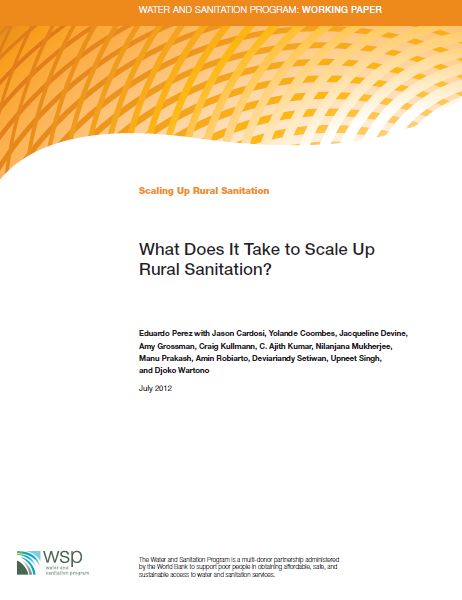What does it take to scale up rural sanitation?
Perez, E., Cardosi, J., Coombes, Y., Devine, J., Grossman, A., Kullmann, C. Kumar, C.A., Mukherjee, N., Prakash, M., Robiarto, A., Setiwan, D., Singh, U., Warton, D. (2012)

Published in: 2012
Publisher:
World Bank, Water and Sanitation Program (WSP)
Author:
Perez, E., Cardosi, J., Coombes, Y., Devine, J., Grossman, A., Kullmann, C. Kumar, C.A., Mukherjee, N., Prakash, M., Robiarto, A., Setiwan, D., Singh, U., Warton, D.
Uploaded by:
SuSanA secretariat
Partner profile:
common upload
4614 Views
38 Downloads
Content - Summary
Over the last 30 years, most rural sanitation projects have had pockets of success, but were small in scale and could not be scaled up. Learning how to expand on the successes of small-scale projects to increase access at large scale has been an enduring challenge. Project outcomes often fail the sustainability test once external funding ceases, and the benefits, even if sustained, remain limited to project areas.
Despite growing political will to do more about rural sanitation, the lack of evidence and examples of effective and sustainable large-scale rural sanitation programs has constrained governments and development partners. In an attempt to help address these issues, starting in 2007, the World Bank’s Water and Sanitation Program (WSP) provided technical assistance to help governments design, plan, implement, and monitor national rural sanitation programs that start at scale and are sustainable. This initiative was carried out in three countries, India, Indonesia, and Tanzania. In each country, at scale service delivery was led by governments, communities, and the local private sector.
Key components are introduced and illustrated with examples from the field, including an overview to programmatic approaches that have been combined and tested to create demand, change behaviors, and improve supply chains: Community-Led Total Sanitation, Behavior Change Communication, and Sanitation Marketing. The Working Paper introduces the basic methodology for these approaches, and the roles of national and local government and the local private sector, and discusses strategies to strengthen the enabling environment and build capacity to achieve and sustain improvements in rural sanitation.
Bibliographic information
Perez, E., Cardosi, J., Coombes, Y., Devine, J., Grossman, A., Kullmann, C. Kumar, C.A., Mukherjee, N., Prakash, M., Robiarto, A., Setiwan, D., Singh, U., Warton, D. (2012). What does it take to scale up rural sanitation?. World Bank, Water and Sanitation Program (WSP)
Filter tags
English Politicians and local decision makers Rural















